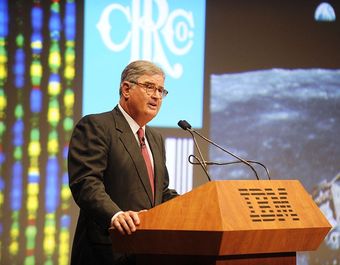 IBM
Chairman Sam Palmisano delivers a speech about
leadership in the global economy at IBM's THINK
Forum held in New York City in September 2011.
Credit: ibmphoto24, flickr
IBM
Chairman Sam Palmisano delivers a speech about
leadership in the global economy at IBM's THINK
Forum held in New York City in September 2011.
Credit: ibmphoto24, flickr A federal carbon cap-and-trade program is dead for the foreseeable future. So is a once promising national clean energy standard.
With climate policy paralyzed in Washington, a number of leading U.S. corporations are going it alone, squeezing big reductions of climate-changing emissions from their operations and supply chains. With stakeholder criticism and other pressures building, more and more are also releasing rigorous climate data in their financial reports and enlisting third-party firms to make sure it is accurate.
"We do it because it makes good business sense—whether it's top of the fold [politically] or not," said Wayne Balta, vice president of corporate environmental affairs and product safety at IBM.
The world's biggest computer services provider is on track to slash its electricity use by 20 percent by the end of this year from 2008 levels. It will also cut its energy-related greenhouse gas emissions by 16 percent from 2005 levels—four percent above its original goal. Earlier this year, the firm won one of the U.S. Environmental Protection Agency's first-ever Climate Leadership Awards.
Balta said that key to those reductions were efficiency upgrades in more than 360 buildings and data centers, which were achieved with the help of 40 full-time energy management professionals. He would not say how much the climate initiatives cost.
Balta emphasized that while IBM's climate efforts have increased, putting efficiency measures into action is nothing new. Between 1990 and 2010, IBM avoided enough electricity to power 520,000 homes for a year; cut its energy bills by nearly half a billion dollars; and as a result prevented the release of 3.8 million tons of carbon dioxide, equivalent to the annual emissions of Cambodia.
FedEx, the world's largest overnight delivery company, is on a similar path. This month, it announced tougher emissions reduction targets for its fleet of nearly 700 aircraft. The firm is now targeting a 30 percent cut in aircraft emissions by 2020 from 2005 levels, up from its previous goal of 20 percent.
89% More Taking Action—but Why?
IBM and FedEx are hardly alone in recognizing the business potential of climate action—even as efforts in Congress stall.
Of the major U.S. corporations surveyed in 2011 by the Carbon Disclosure Project (CDP), a London-based nonprofit, 89 percent more were taking action on climate change than in 2010.
Last year, 214 of the biggest public firms in the United States told the CDP they had set emissions targets, a nearly 30 percent rise from the previous year. Zoe Tcholak-Antitch, director of CDP's North America office, said that's a significant jump considering the number hasn't really changed in the past few years.
"That's a very positive indicator ... that the U.S. corporate community is taking emissions reductions seriously," she said.
David Rosenheim, executive director of the Climate Registry, the nation's largest carbon reporting entity, said he sees the same increasing interest. Since 2007, its membership has grown from 243 founding members that work with the registry to report and reduce their emissions to about 400 today.
There are three main reasons why firms are voluntarily stepping up climate efforts, company representatives and advocates told InsideClimate News. The first is the tough economy, which has prompted businesses to rigorously track spending on fuel and electricity use—and to dramatically reduce it.
Shipping giant UPS, for instance, which has an annual vehicle fuel budget of over $1 billion, has made trimming its jet fuel footprint a key priority. "We look at fuel conservation programs as part of our economic picture," said spokesperson Lynnette McIntire in an interview. Last year it avoided 8.4 million gallons of gasoline, enough to fill up the tanks in nearly a quarter million SUVs.